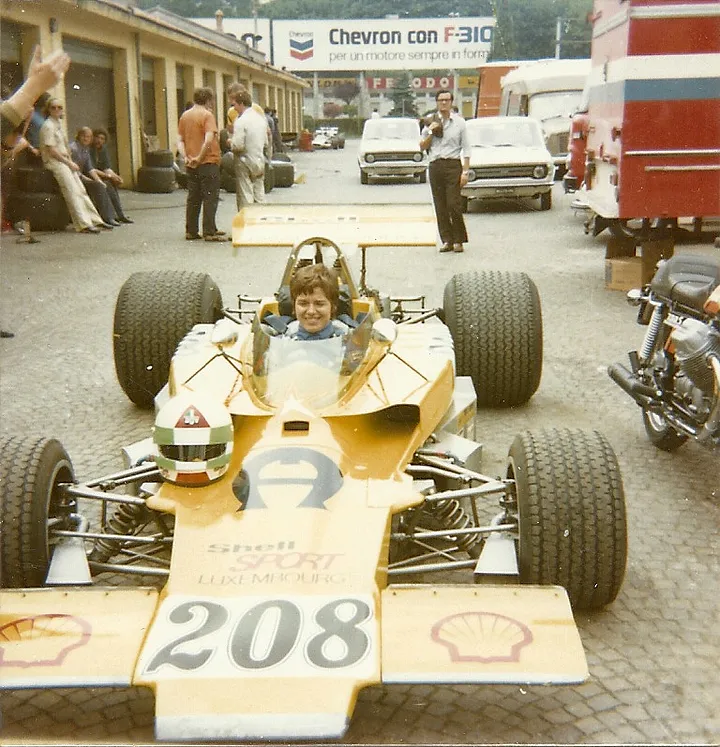With the present conjuncture, it is hard to imagine a Grand Prix with a woman as the starter of any car in Formula 1; yet not so far back, women have been quite successful and masterful starters in motorsports.
Spanning from 1958 to the 2010s, women’s careers in F1 have been complex, more than often paved with many obstacles that these gifted drivers have bravely worked around. With the birth of the F1 Academy and the very first televised Grand Prix races for women this year, it is more than time to acknowledge, celebrate and remember the insane talent and work that these women have put in throughout the years to open a door for female drivers to barge in and build entire careers on.
This is not another inspirational article for women sports but a radical pledge for the acclamation these drivers deserve for winning outstanding titles and long desired positions in the most prestigious GPs in the past six decades.
Maria Teresa de Filippis
At the end of World War II, Maria Teresa de Filippis developed a deep love for motorsports, leading her to win her first race following a bet with her brother at the age of 22. During the year 1954, she decided to try her luck at the Italian Sportscar National Championship and finished second, a first for a woman. Following this win, she was recruited by Maserati as a works driver which led her to take part in several major events to finally reach the year 1958 when she got to drive a F1 car for the first time at the Monaco Grand Prix. Out of 31 contestants aiming to qualify, she unfortunately missed her chance by a close 5,8 seconds, nonetheless giving her the opportunity to become a part of the Formula 1 tight masculine circle of the time. The F1 champion Juan Manuel Fangio told her at that time : “You go too fast, you take too many risks.”

The same year however, she finally makes her long awaited first F1 debut at the Spa Francorchamps Grand Prix Out of over thirty drivers, she managed to finish 10th in this Grand Prix which was an outstanding accomplishment knowing nine cars did not even finish the race. The same year, the French Grand Prix managers did not allow her to compete in the race, de Fillipis explaining later that the director of the race stated that “the only helmet a woman should wear is the one at the hairdresser’s”. The same year she also attempted the Grand Prix races in Portugal and Italy but her car suffered severe engine problems and she had to retire from both races. She decided to definitely retire from motorsports racing in 1959 following the death of Jean Berhra, the Porsche Team Leader that she was a part of and a close friend of. In 1979 however, she joined the International Club of Former F1 Grand Prix Drivers and even became the VP of the entity in 1997. She sadly passed in 2016 at the age of 89, leaving behind her a legacy that goes beyond what words can express for women in Formula 1n and other racing categories.
2. Lella Lombardi
15 years have passed since De Filippis retired from driving Formula 1 when in 1975, another Italian woman participates in a Grand Prix, in Spain, and scores individual and team points. Falling in love with driving at a young age while helping her family’s delivery van business, Lella began her apprenticeship by driving kart, Formula 3 and 5000. In 1975, she joins the March engineering team and is the second woman ever to be selected to compete in the South African Grand Prix and is the first woman to score point at the Italian Grand Prix after completing 23 laps.

She quickly continued to evolve and get better with each race, finishing the German Grand Prix at the seventh place and also got invited as part of the Williams Team to compete in a special race at the USA Grand Prix this same year. She put an end to her F1 career in 1976 after racing for both March and RAM and scoring new records for women in this discipline. She continued to race in other categories and types of events such as the 6 hours of Pergusa and Vallelunga, the 24H of Le Mans in France and completing a year in NASCAR with other remarkable female drivers such as Janet Guthrie and Christine Beckers. In 1988, she decided to put a definite end to her career before creating her very own racing team and events named Lombardi Autosport in 1989. She sadly passed in 1992 at the age of 50, leaving behind her a legacy of unseen before achievements for women in motorsport.
3. Divina Galica
Divina Galica started her professional sports career in the Ski Olympics Team in Great Britain as captain between 1968 and 1972. Soon after she decides to start another successful sports career in parallel in Formula 2 and quickly after Formula 1 as well. She rode a Formula 1 car for the first time in 1976 at the British Grand Prix making this year an historical one as the first ever race to have more than one woman as a starter in the race (Lombardi). She went on trying for the qualifiers of other Grand Prix races between then and 1978 but failed to qualify for any of them. Racing for the Shellsport International Series and British F1, she never got any wins but contributed an ambition and fearlessness to the sport that brought inspiration and motivation to many women around the world to enter the Formula 2 circuit as well.
4. Desire Wilson
Wilson competed in a single Formula 1 race and it took place at the 1980 British Grand Prix. Unfortunately she did not qualify but she remains known as the only woman in the world to ever win the closest to an F1 race that ever existed : the Brands Hatch race of the 1980 Aurora F1 Championship, resulting in one of the grandstand being named after her. Adding to the list of her unique achievements in the sport as a woman, she is the only woman ever licensed to drive CART Indycars events as well as a super licence (an element that became a requirement to drive any F1 car event after 1992). She also won other significant races such as Monza 1000 kms and the Silverstone 6 Hours in 1980; she remains the only woman to have won a world championship race of that measure and her book about being a woman racer remains an absolute classic.
5. Giovanna Amati
Amati is the last woman to have officially participated in a Formula 1 race. This took place in 1992 when she competed in three different races. Her career evolved from Formula Abarth to Formula 3 and then Formula 3000 before she was recruited as a Brabham F1 driver in 1992. She tried her luck at the South Africa, Mexico and Brazil Grand Prix races but did not qualify for any of them. She was fired from the Brabham Team and replaced by Damon Hill but he also did not qualify for any races this year. After her brief experience in Formula 1, Giovanna won the Women’s European Championship in 1993 and kept competing in the Ferrari Challenge between the years of 1994 and 1996. She then retired from motorsports altogether but left some incredible achievements to pursue.
6. Katherine Legge
She was the second woman to test an F1 car in 2005 (The Minardi) and this outstanding British driver is an IMSA Sports Car Championship competitor and is part of the NASCAR Xfinity Series as well. She was the very first woman to take pole in the ZETEC race in the year of 2000 and competed in the Renault Formula Championship in Great Britain in 2002, taking the pole position with the fastest lap time of 1,19,292 beating Kimi Raikkonen by far.

7. Sarah Fisher
She was the very first woman to ever test a Formula 1 car for McLaren in 2002 at the United States Grand Prix. She entered the competition in 82 IndyCar races placing second in the Miami Grand Prix and making her the first woman to do so. She was the very first woman to take pole position in the American Open Wheel Race in 2008 and is the woman with the highest number of entries in the Indianapolis 500 with a total of nine completions.
8. Susie Wolff
Susie Wolff was signed as a development driver for Williams Racing in 2012 and she was consequently the first woman to drive a F1 car in 22 years when she got to participate in the 2014 British Grand Prix in Silverstone. She also competed in Renault Formula and Formula 3 before moving on to Formula 1. In 2015 she announced her retirement as a driver but continued to advocate for women in motorsports ever since, becoming the team principal and CEO for Venturi Racing in Formula E until 2022. She then participated in multiple initiatives for the progress of women in Formula 1 like FIA Girls on Track before eventually becoming the managing director of the F1 Academy.

The only valuable conclusion to this article remains this quote by Susie Wolff summing up beautifully the irrelevance of gender in high-performance sports :
“You have to be ready to pounce when a rare chance comes. It doesn’t bother me if I’m getting attention because I’m a girl. I dared to be different, I want to inspire others to do the same. Your gender becomes irrelevant when you are in a performance-based environment.”






